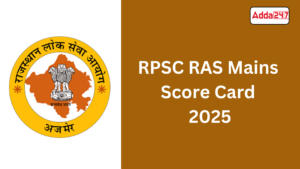Table of Contents
Candidates preparing for the UPSC Mains Exam must thoroughly cover the entire UPSC Mains Syllabus from the beginning of their preparation itself, in an integrated manner with the prelims exam. The Union Public Service Commission (UPSC) includes a wide array of subjects in the mains exams, such as Indian History, Geography, and General Studies, many others. The UPSC Civil Services Examination is a prestigious test of skill and knowledge, and understanding the UPSC Mains Syllabus 2025 is crucial for cracking it. As a dedicated aspirant, you must grasp the vast range of subjects covered in the syllabus.
UPSC Mains Syllabus 2025
To succeed in the UPSC CSE Mains exam, candidates need to know the UPSC Syllabus for mains and exam patterns as well. Read further and learn about the mains exam syllabus and for a speedy overview, check the table below.
| UPSC Mains Syllabus 2025 | |
| Category | Syllabus |
| Paper | Mains |
| Exam Date | To be Announced |
| Number of Papers | Nine |
| Types of Paper | Conventional Papers (Descriptive Type) |
| Duration of Exam | 3 hours Each Paper |
| Total Marks | 1750 |
| Language of Exam | English & Hindi (Except Language Paper) |
| Negative Marking | No negative marking |
UPSC Mains Exam Pattern 2025
Clearing the Prelims cut-off is the first step to qualifying for the UPSC Mains exam. This stage is crucial as it directly impacts your scores and rank. The Mains exam requires in-depth knowledge and analytical skills, with a subjective format that tests your understanding in detail, unlike the Prelims, which focus on a broad range of topics.
The main exam consists of nine papers, but only seven papers are considered for the final merit list: General Studies Papers I, II, III, IV, Essay, and the two Optional Papers (Paper I and Paper II). The remaining two papers, English and Indian Language, are qualifying in nature. While these papers do not count towards your final score or rank, you must still qualify them to be eligible for the interview stage of the UPSC exam in 2025.
| UPSC Mains Exam Pattern 2025 | ||
| Qualifying Papers | Topics | Marks |
| Paper-A | One of the Indian languages listed in the Constitution’s Eighth Schedule needs to be selected by the candidate. | 300 |
| Paper-B | English | 300 |
| Papers Counted for Merit | ||
| Paper 1 | Essay Paper | 250 |
| Paper 2 – General Studies I | General Studies Paper I consists mainly of the History and Geography of the World and Society, Indian Heritage, and Culture. This paper mainly revolves around History, Geography, and Society. | 250 |
| Paper 3 – General Studies II | General Studies Paper II consists mainly of Polity, Constitution, Governance, Social Justice, and International relations. | 250 |
| Paper 4 – General Studies III | General Studies Paper III consists mainly of Economic Development, Technology, Environment, Biodiversity, Security, and Disaster Management. | 250 |
| Paper 5 – General Studies IV | General Studies Paper IV consists mainly of Ethics, Integrity, and Aptitude. | 250 |
| Paper 6 | Optional Subject – Paper 1 | 250 |
| Paper 7 | Optional Subject – Paper 2 | 250 |
| Sub Total (Written Test) | 1750 | |
| Personality Test | 275 | |
| Grand Total | 2025 | |
UPSC Mains Syllabus
In addition to the Indian Language and English Papers, the remaining papers in the main examination are considered for determining final merit list. To thoroughly understand the UPSC CSE Mains Syllabus, including the General Studies and Essay papers, we recommend reading the complete article, which provides comprehensive coverage.
Essay Paper
The UPSC Mains Essay paper evaluates a candidate’s skill in articulating and expressing ideas clearly and coherently. There is no official syllabus for this paper. Candidates must write two essays from a list of topics, each worth 250 marks.
UPSC General Studies I Syllabus
The first General Studies paper primarily focuses on the History, Heritage, Geography, and Culture of the World and Society. The commission has outlined the key themes encompassed in the General Studies I syllabus, which are listed below for the candidate’s reference.
Indian Heritage and Culture, History and Geography of the World and Society:
- Indian Culture: It covers the salient features of Art Forms, Literature, and Architecture from ancient times to modern times.
- Modern Indian History: It includes the significant events, personalities, and issues from the middle of the 18th century until now.
- In The Freedom Struggle, Various stages, important contributors, and contributions from different parts of the country.
- Consolidation and Reorganisation of the country after independence.
- Events from the 18th century will be included in the history of the world, such as the Industrial Revolution, world wars, redrawing of national borders, colonization, and decolonization, as well as political philosophies like communism, capitalism, socialism, and others—their manifestations and social effects.
- Important characteristics of Indian society and India’s diversity.
- The role of women and the organization of women, population and related issues, poverty and developmental challenges, urbanization, related issues, and solutions.
- The social effects of globalization in India.
- Communalism, Regionalism, Secularism, and Social Empowerment.
- Important physical geography characteristics of the world.
- Distribution of major natural resources worldwide (including South Asia and the Indian subcontinent); determinants of where primary, secondary, and tertiary sector industries are located globally (including India).
- Critical geographic features and their location-changes in flora and fauna, as well as in water bodies and ice caps and the impact of such changes. Important geophysical phenomena include earthquakes, tsunamis, volcanic activity, cyclones, etc.
UPSC General Studies II Syllabus
The Polity, Governance, Constitution, Social Justice, and Interrelations topics are covered in the UPSC Mains Syllabus General Studies II paper. The detailed syllabus is provided to candidates below.
Governance, Polity, Constitution, Social Justice, and International Relations:
- The basic structures, features, modifications, major provisions, and historical context of the Indian Constitution.
- Functions and duties of the Union and the States, problems and difficulties with the federal system, and obstacles with the devolution of authority and resources to local levels.
- Power separation between multiple organs, conflict resolution procedures, and institutions.
- Comparing the Indian constitutional design to other countries’ systems.
- Structure, administration, business practices, powers, and privileges of the Parliament and State Legislatures, as well as challenges resulting from these.
- Governmental Ministries and Departments; Pressure Group organizations and formal/informal associations; and their purpose in the Polity.
- Structure, organization, and operation of the Executive and the Judiciary.
- The Representation of People’s Act’s key characteristics.
- Appointment to several constitutional Bodies, as well as their respective duties and responsibilities.
- Statutory, regulatory, and various quasi-judicial agencies; Government interventions for development in many sectors; Problems resulting from the planning and execution of these interventions.
- The role of NGOs, SHGs, diverse groups and associations, funders, charities, institutional, and other stakeholders in development processes and the development industry.
- Welfare programs put in place by the federal government and individual states for the population’s most vulnerable groups, as well as the effectiveness of these programs; institutions, laws, and other organizations created to safeguard and improve the lives of these vulnerable groups.
- Issues on the growth and administration of the social sector and services in the fields of health, education, and human resources.
- Hunger and poverty-related issues.
- Transparency and accountability are crucial components of governance, as are e-governance applications, models, accomplishments, limitations, and possibilities; citizens’ charters, transparency & accountability, and institutional and other measurements.
- The function of the civil service in a democracy
- India’s relationship with its neighbours.
- Groupings and agreements at the bilateral, regional, and international levels involving or impacting India and/or its interests.
- Effect of developed and developing countries’ policies and politics on India’s interests and the Indian diaspora.
- Important international organizations, agencies, and forums: their makeup and objectives.
UPSC General Studies III Syllabus
The subjects of Science, Technology, Economics, Defense, Disaster Management, and Nature are thoroughly covered in UPSC Mains General Studies III. This paper will raise ask relating to many facets of life as well as recent developments in all areas of life.
Economic Development, Technology, Environment, Bio-diversity, Security and Disaster Management:
- Indian Economy, including planning, resource mobilization, growth, development, and employment difficulties.
- Inclusive growth and the problems it raises.
- Budgeting of Government.
- Major crops, patterns of cropping in various regions of the nation, various types of irrigation and irrigation systems, challenges with storage, transport, and marketing of agricultural products, and related limitations; the use of e-technology by farmers.
- Concerns about buffer stocks and food security, direct and indirect farm subsidies, and minimum support prices; Public Distribution System goals, operations, and shortcomings; Technology missions; and the economics of animal husbandry.
- Food processing and related sectors in India: their size and importance, where they are, what is needed in the upstream and downstream, and supply chain management.
- Indian land reforms.
- The economic implications of liberalization, changes to industrial policy, and how these affect the expansion of the industrial sector.
- Infrastructure includes things like ports, roads, airports, and railroads.
- Models for investments.
- Science and technology breakthroughs, as well as how they are used and impact daily life.
- Scientific and technological advances made by Indians; indigenization of technology; and the creation of new technology.
- Awareness of issues relating to intellectual property rights as well as IT, space, computers, robotics, nanotechnology, and biotechnology.
- Environmental impact assessment, pollution and degradation of the environment, and conservation.
- Disasters and disaster management; Relationships between extremism’s growth and dissemination.
- The contribution of non-state and state actors from outside to the problems with domestic security.
- Threats to internal security posed by communication networks, the media’s and social media’s role in such threats, the fundamentals of cyber security, and money laundering and its prevention.
- Security issues and how to manage them in border regions – connections between organized crime and terrorism.
- The function of various security agencies and organizations.
UPSC General Studies IV Syllabus
Ethics, Integrity, and Aptitude: This essay tests how well candidates uphold morals and honesty in public life. It looks at how they handle ethical dilemmas and make decisions in tough situations. The paper often includes real-life case studies to challenge candidates’ problem-solving skills and ability to apply ethical reasoning to social issues and conflicts. This helps assess their ability to deal with ethical and professional challenges effectively.
- Emotional intelligence concepts, as well as their benefits and use in governance and administration.
- Contributions from moral philosophers and thinkers in India and around the world.
- Public/Civil Service Values and Ethics in Public Administration: Status and Issues; Ethical Issues in International Relations and Funding; Corporate Governance; Laws, Rules, Regulations, and Conscience as Sources of Ethical Guidance. Accountability and Ethical Governance.
- Probity in governance includes the idea of public service, the philosophical underpinnings of governance and probity, information sharing and transparency in government, the right to information, codes of ethics and conduct, citizen’s charters, workplace culture, the effectiveness of service delivery, the use of public resources, and challenges posed by corruption.
- Case Studies on the aforementioned concerns.
- Ethics and Human Interaction: The purpose, factors, and outcomes of ethical behavior in people; the dimensions of ethics; and the application of ethics in both personal and professional settings. The importance of family community and educational institutions in instilling values may be seen in the study of human values, which draws lessons from the lives and teachings of great leaders, reformers, and administrators.
- Civil service aptitude and core principles, including honesty, objectivity, and non-partisanship; dedication to public service; empathy; tolerance; and compassion for the weaker groups.
- Moral and political attitudes, social influence, and persuasion are all aspects of attitude that include its content, structure, and function as well as its relationship to cognition and behavior.
UPSC Mains Syllabus for Language Paper
In the UPSC Mains Exam, candidates are required to appear for two language papers: Paper A and Paper B. For Paper A, candidates need to select a language from the options listed in the Eighth Schedule of the Indian Constitution, as provided in the table below. The selected language must be written in the corresponding script mentioned below.
English serves as the second language paper. Candidates have the flexibility to choose any of the Indian Languages listed in the table for their language paper.
| UPSC Syllabus Main Languages Paper | |
| Language | Script |
| UPSC Assamese | Assamese |
| UPSC Bengali | Bengali |
| UPSC Gujarati | Gujarati |
| UPSC Hindi | Devanagari |
| UPSC Kannada | Kannada |
| UPSC Kashmiri | Persian |
| UPSC Konkani | Devanagari |
| UPSC Malayalam | Malayalam |
| UPSC Manipuri | Bengali |
| UPSC Marathi | Devanagari |
| UPSC Nepali | Devanagari |
| UPSC Odia | Odia |
| UPSC Punjabi | Gurmukhi |
| UPSC Sanskrit | Devanagari |
| UPSC Sindhi | Devanagari or Arabic |
| UPSC Tamil | Tamil |
| UPSC Telugu | Telugu |
| UPSC Urdu | Persian |
| UPSC Bodo | Devanagari |
| UPSC Dogri | Devanagari |
| UPSC Maithili | Devanagari |
| UPSC Santhali | Devanagari or Olchiki* |
|
Note: The question paper for the Santhali language will be printed in Devanagari script, however, candidates are free to answer in Olchiki or Devanagari.
|
|
Let’s explore the structure of the language papers, namely Paper A and Paper B, in detail. The following section provides a comprehensive breakdown of how these papers are organized.
- Essay – 100 marks
- Reading Comprehension – 60 marks
- Precis Writing – 60 marks
- Translation: (i) English to Compulsory Language (e.g. Hindi) – 20 marks and (ii) Compulsory Language to English – 20 marks
Grammar and Usage of Basic Language – 40 marks.
UPSC Optional Subjects For Mains
Candidates can check the UPSC Mains Optional Paper list of subjects. Aspirants can choose any two subjects provided in the table below. Each subject includes two papers, Paper 1 and Paper 2, each worth 250 marks, totaling 500 marks.
| UPSC Mains Syllabus For Optional Subjects | ||||
| Agriculture | History | Geography | Economics |
Electrical Engineering
|
| Zoology | Geology | Law | Philosophy |
Commerce and Accountancy
|
| Sociology | Psychology | Statistics | Botany |
Mechanical Engineering
|
| Medical Science | Chemistry | Physics | Management |
Animal Husbandry and Veterinary Science
|
| Anthropology | Mathematics | Civil Engineering | Public Administration |
Political Science & International Relations
|
| UPSC Syllabus | |
| UPSC History Syllabus | UPSC Management Syllabus |
| UPSC Geography Syllabus | UPSC Polity Syllabus |
| UPSC Psychology Syllabus | UPSC Anthropology Syllabus |



 APSC Syllabus 2025, Download Prelims And...
APSC Syllabus 2025, Download Prelims And...
 Punjab PCS Syllabus 2025, New Prelims an...
Punjab PCS Syllabus 2025, New Prelims an...
 RPSC RAS Mains Score Card 2025 Out, Chec...
RPSC RAS Mains Score Card 2025 Out, Chec...
